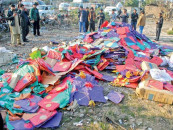Book Bank initiative in doldrums
Most books collected by the Department of School Education are not in usable condition for the current academic year

As the academic year begins in Sindh, the Department of School Education faces another setback. Despite its efforts to address persistent textbook shortages through the "Book Bank" initiative-designed to recycle old textbooks for new classes-the program appears to have hit a roadblock.
Last year, the department fell short by approximately 2.1 million books out of a required 4.2 million, and the initiative's failure, experts believe, will only exacerbate the ongoing crisis.
According to details gathered by the Express Tribune, most students have not returned their textbooks after finishing the academic year, and those that are returned are in tatters, with torn and scattered pages, making them unusable for incoming students.
Commenting on the situation, Director of Secondary and Higher Secondary Education, Arshad Baig, told the Express Tribune distribution of books was underway, with the Deputy Commissioner overseeing the process. However, when asked about the collection of old books, Baig acknowledged that no data is available on the number of books gathered. "Compiled data will be shared once available," he added.
In a letter issued in May, Dr. Fauzia Khan, Chief Adviser of the Curriculum Wing, cautioned all school directors of delays in textbook publication and distribution due to logistical challenges. To address these delays, the department proposed retrieving textbooks from students across all school levels to establish a book bank. Another letter last month, a copy of which is available with the Express Tribune, reiterated the directive to collect textbooks and establish the book bank. However, when contacted, both a head teacher and a district education officer described the returned books as unusable.
A school principal explained that the Sindh Textbook Board provides jacket books, with multiple subjects bound in one volume. Often, he said, some parts of these volumes are missing or damaged, complicating distribution. "When new textbooks arrive, some students will have brand-new books, while others will rely on the old, tattered ones," he added, speaking on the condition of anonymity.
Troubles in production
Last year, 2.4 million sets of textbooks were provided for an enrollment of over 4.2 million students, resulting in a shortfall of approximately 2.1 million books. According to an academic expert, this gap highlights the urgent need for timely tendering and production of textbooks. The shortfall is unlikely to be addressed by initiatives like the Book Bank, which cannot ensure that returned books are in a usable condition.
According to details available with the Express Tribune, this year's tenders for the production of textbooks were delayed until February and March, with the academic session postponed to August 15. The tendering process faced further complications from publisher disputes, which resulted in legal challenges and further delays. Even though the academic session was extended by 14 days citing weather-related concerns, the distribution of textbooks, department insiders revealed, only started this week.
In an interview with The Express Tribune, Secretary of the Sindh Textbook Board, Hafeezullah, claimed that textbook distribution had begun in Karachi and that schools in Malir had started receiving books. Hafeezullah stated that the Sindh Textbook Board anticipated collecting about 25 per cent of textbooks through the book bank. Nevertheless, with 4.4 million sets of books prepared, he assured that students would not face a shortage.
Details reveal that the School Education Department recently informed the chief minister's office that government school enrolments in Sindh exceed 5.2 million, suggesting a potential shortfall of more than 0.7 million books.



















COMMENTS
Comments are moderated and generally will be posted if they are on-topic and not abusive.
For more information, please see our Comments FAQ